About the secrets of Tao-Tai Chi Chuan
The secrets of Tai Chi Chuan?
There is no secret.
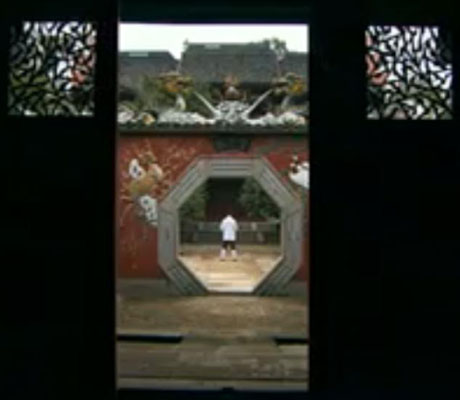
There is only a secret behind the secret.
A secret is too kind a word for something we don't understand yet.
Time goes, you say? Ah no.
Alas, Time stays, we go.
A.Dobson-The paradox of time.

Nothing puzzles more than time and space.
But
Tao Tai Chi Chuan emphasizes the essence of change rather than time.
Tao Tai Chi Chuan emphasizes the essence of relations rather than space.
Tai Chi Chuan emphasizes the essence of change and relations.
Keep in mind: "Everything has its equal and it’s opposite!"
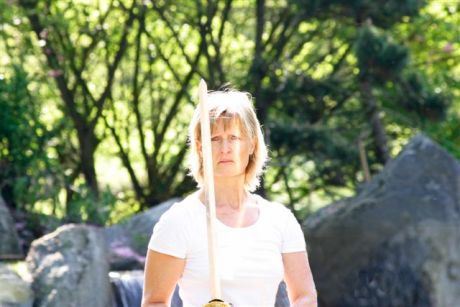
We should follow the Tai Chi principles of opposites:
When you move upward the mind must be aware of downward.
When you move downward, the mind must be aware of upward.
When moving forward, the mind thinks of moving backward.
When shifting to the left side,
the mind should simultaneously notice the right side.
When shifting to the right side,
the mind should simultaneously notice the left side.
The center is the
empty space. It’s a meeting and a
changing point.
Secret number 1:
Our patience will achieve more than our force.
Everything is difficult before it becomes easy.
Patience is your greatest treasure (Chinese proverb).
Secret number 2:
There are 3 ways to learn Tai Chi Chuan:
1° Exercise.
2° Exercise.
3° Exercise.
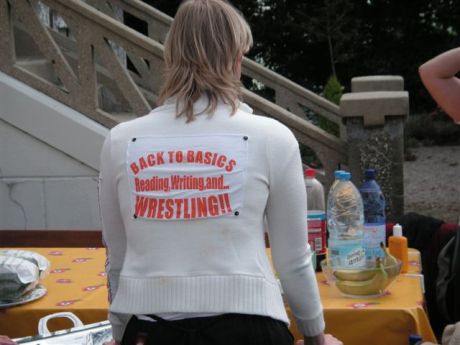
Secret number 3:
Back to basics.
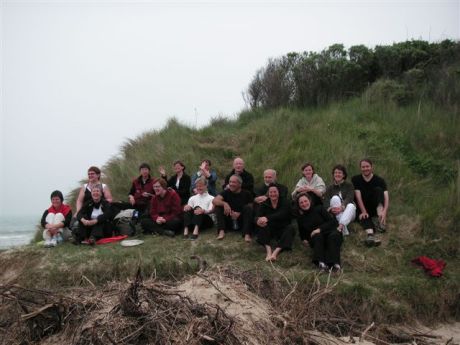
Secret number 4:
Be happy,
nothing is under control.
Secret number 5:
Keep it simple.
Go your own way, take a walk on the wild side.
Dear Erle,
Thank you for the video. It's really great. But, can you tell me why no one does
Taiji like you, I mean opening and closing and things like separation of yin and yang etc.
Why it seams that so called great masters do things like double weighting. Thank you.
Dear Robert,
It all began at the beginning of this (20th) century when all of the great masters had a meeting!
At that meeting they decided that too many people were getting the good oil on their family systems.
So they all (bar one) agreed to change the forms and only teach the very basic forms. Trouble was that
people found these forms quite easy and as humans are, left their teachers before they were ready and
taught the very basics thinking that this was all there was!
Hence nowadays I only know a couple of modern masters who are doing it correctly! Most break some or all
of the rules of the classics! The one who did not change his forms was Yang Shou-hou who, for this reason
only ever took on 3 students, one of whom (thankfully) was my main teacher, Chang Yiu-chun.
The closest you can get to the original Yang from anyone else is from Mr Chang in Louisiana who is now 82
and who is a student of Chen Pan-ling who was one of the three also. However, Chen changed the system
slightly and called it his 'synthesized version' where he mixed some Wu style in with it. It is well
documented in a new book and wall chart published by Chang in the USA and is quite close to the Original Yang.
Kind Regards
Erle Montaigue
Chang Yiu-chun, The Last Interview
By Erle Montaigue
In my final term with Chang I became adept at phrasing questions so that I would not end up in great pain
and I would ask questions that I needed to know the answers to as I guess I sensed that he would not be
around for much longer. I told him that the way that he did his Taiji form was still greatly different to what
I was doing, even though I thought that I was doing it at the highest level. His answer was like a hammer to my
head and something that I still remember with vivid detail.
"You are doing Taiji, I am not".
I was a little worried about this statement. Before I could question him further he answered me.
"Go around to all of the Taiji classes. And then come back to me. If you still wish to do Taiji, then go and learn
from them."
By this stage, I was more than a little confused but Chang would not be budged on this, no more questions.
I did what he wanted me to, even though I knew what the others were teaching and something fell on me. Even though
they were doing different styles, Chen, Yang, Wu etc. They were all still "doing" Taiji. It seemed like an effort,
like it was something different that they had to do each day. Whereas when Chang did it, it was as if he was not
doing anything, he would talk to me while he was doing his form, he would look around, take in the local scenery,
but he was always so still and at peace with everything. He would never actually finish the form, but rather just
move into another area of form, like walking to his place of residence, or having a cup of tea.
My next visit to Chang, was different. I told him that he was not doing Taiji but rather living Taiji. He answered
again in the negative. "No, you are still wrong, I am not living anything, I am Taiji". He went on, "You are trying
to do Taiji, so you will never realise the fighting of Taiji nor the healing of Taiji. You are much stronger than me,
and faster, but I seem faster and stronger than you. I am not. I am Taiji."
From then onward, I tried to be Taiji with every waking and sleeping moment being as if I were still doing the form.
That was his greatest gift to me. To show me to not do Taiji.
Later and just before he left, Chang told me about the more physical reasons as to why he was not doing Taiji. He
even said that he would probably not even call his Taiji, "Taiji" but rather take it back to its original name of
"Hao Ch'uan" which means loose boxing. This, too, came as a big shock as I thought that the name "T'ai Chi Ch'uan"
had been with us from the start, but it has not. In fact, if Yang Lu ch'an came back to us now, he would probably
want to learn this great new art that had the temerity to take on the name of "The Supreme Ultimate Boxing". That
name has only been with us, Chang tells me, and as I have also read in other writings since then, since the late 1800's.
Before that it was called Loose boxing. Chang would say, "look at them", on many of the occasions when we would stay
concealed and watch a Taiji class, "does that look like loose!" They are slow and very relaxed, but it is not loose,
they move like a box!" And it was true, they were moving like boxes. And that was the most poignant thing that anyone
has ever said about anyone else's Taiji, they move like boxes.
We spend many hours trying to get our bones all moving together, but when Chang did it, it was as if his bones were
not connected, but rather, one tiny movement down here would set something in motion up here, and one tiny movement up
here would set the whole body into motion, not altogether, but rather a millisecond after that initial movement. And
isn't that the way fa-jing is used?" This was the physical difference between my own "Hao Ch'uan" and his. There were
so many little shaking movements, so small that one would only know that there was something different. Only once did
Chang do the form so that I could see all of the shakes and that was enough. That was my last lesson with him. Upon
which he said, and I will use his exact words here, "No need me". He was never at our training spot again.
His muscles were gone, he could not make use of the ground any more as for this one needs to have physical strength
but he was strong and I often wonder whether it was just that I was at a low level of training at that time, but I
don't think so, I was strong then, much stronger and younger than I am now, and yet I could not match him, and yes,
I did try. I was never one for "playing the game" of pleasing the master, which got me into much trouble in my earlier
years with other masters.
I know that Chang went back to China and would like to think that he is still alive on some mountain top. But if he
were here, I can hear him saying in Chinese, something like the equivalent of "Bullshit!" That's the was he was, an F.C.
in the true sense of the word.
For those of you wondering what F.C. means. It's a secret society of martial artists, and others who have passed the true
test of life.
Erle Montaigue
Link to website Erle Montaigue
 Taoistic Classics: About Utopia
Taoistic Classics: About Utopia
Let your community be small, with only a few people;
Keep tools in abundance, but do not depend upon them;
Appreciate your life and be content with your home;
Sail boats and ride horses, but don't go too far;
Keep weapons and armour, but do not employ them;
Let everyone read and write,
Eat well and make beautiful things.
Live peacefully and delight in your own society;
Dwell within cock-crow of your neighbours,
But maintain your independence from them.
Lao Tse
 About time
About time
Let not time deceive you. You cannot conquer time.
(W.H. Auden)
 About Time and Eternity
About Time and Eternity
If time is a flow, then eternity is the stream itself. When we watch the water flowing past, somewhere between the source and the mouth, everything is in perpetual motion. The water comes and goes, nothing remains. But when we see the stream itself, we see the whole and we know that nothing disappears and nothing perishes. All the water is present at the same time and every drop comes to every place, even if each particle disappears from view at every moment if we focus our perception only on a given point. The water does not change, and the stream does not change. The source is still the source, even if the water flowing from it at a given moment has reached the ocean.
Bron: Gerard Bodifee, Meant to Be, to be published by Yale University Press.
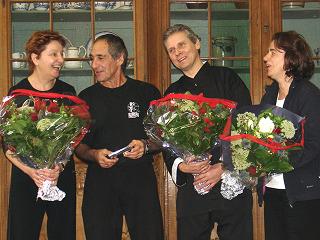
We can read sophisticated books to understand the secret of
Tai Chi Chuan or the secrets of Taoism.
No problem.
But according to me there is no secret.
There's just the secret behind a secret.
A secret is too kind a word;
it's a euphemism for something I don't understand,
for something I don't understand yet.
The way I think about it now Taoism is only a kind of longing,
it's a wish to feel at home,
always and everywhere.
For some people Tai Chi Chuan can be a brilliant tool
of Taoism for on the road.
The truth can never be bigger than my head and than my heart,
which has to understand that truth.
Take care of yourself, may God bless you and thanks for visiting us.
Walter.